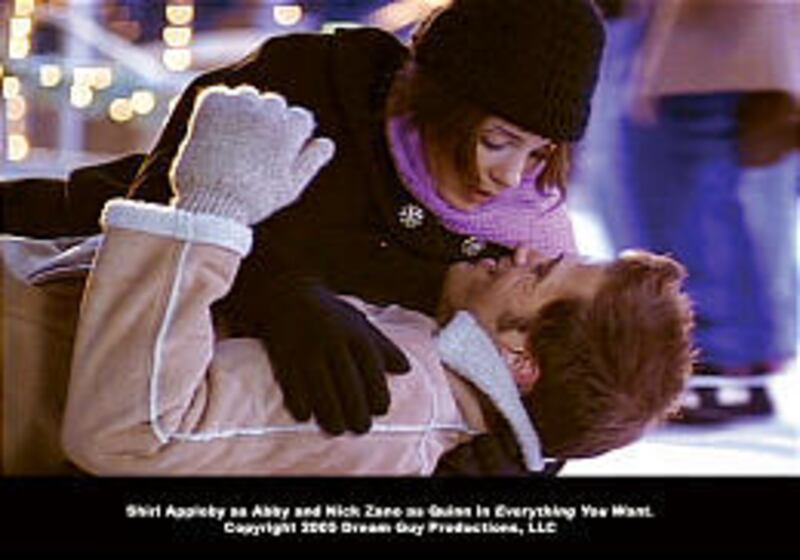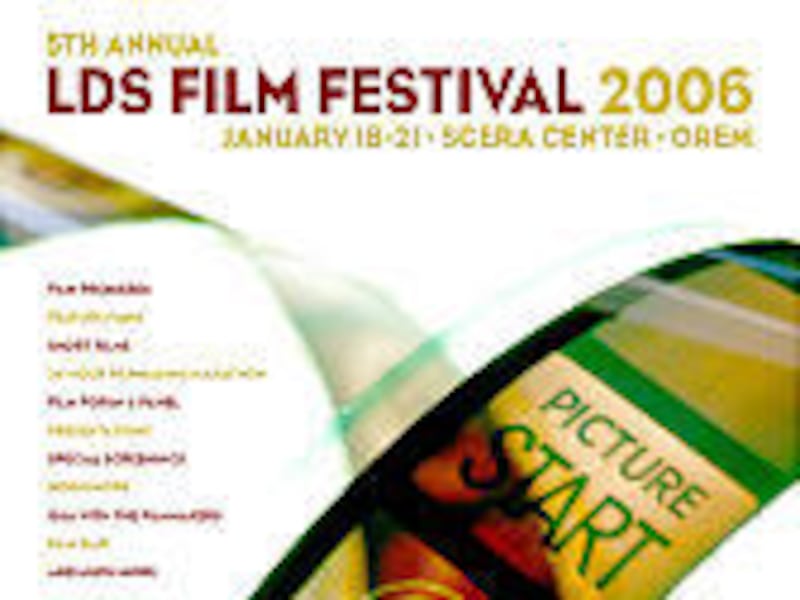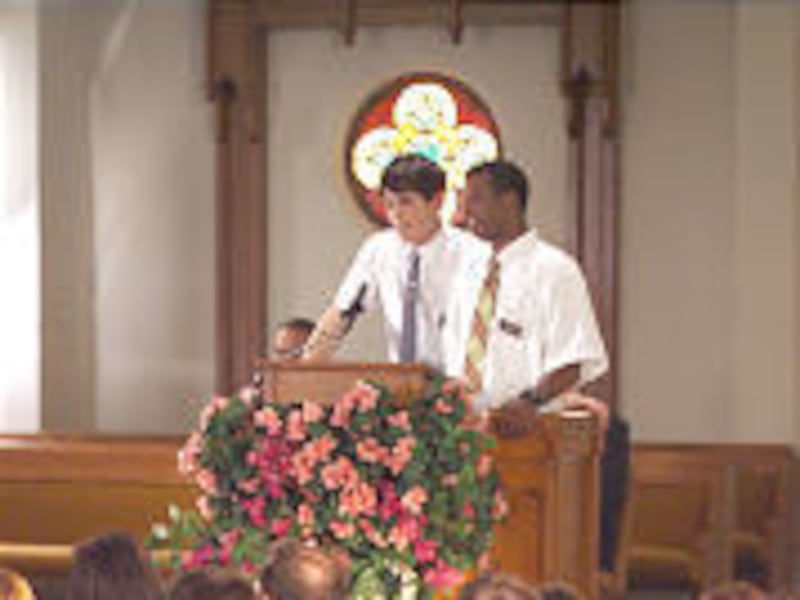OREM — The LDS Film Festival may not bring in the Jennifer Anistons and Robert Redfords but it's steadily gaining a following.
More than 3,000 people bought tickets and adjusted their lives to include catching some of the films at the fifth annual weekend event, held at the SCERA Center for the Arts for the first time.
So many people showed up that it made for a few logistical problems. Venues had to be switched and there were a number of delays. A DVD player burned out mid-movie because it overheated from the workload.
But generally, there was a great deal of interest in how to make LDS movies, how to market LDS movies and what an LDS movie really ought to be.
Known as the Mormon filmmaker who introduced the LDS culture as serious movie fodder, Richard Dutcher made an appearance as did a number of local film-makers and production gurus.
Festival founder Christian Vuissa said he is amazed at the growth in filmmaking and in the level of interest in the festival.
"We kind of predicted it but had no idea it would happen so fast," Vuissa said. "Our community is learning. We're learning. Before, people didn't even know it was possible (to tell LDS stories), but now there are hundreds of us."
Kurt Hale, of HaleStorm Entertainment, said part of the growing process is financially painful as more Screen Actors Guild cast members are used.
That increases the potential for creating a movie with credibility but pushes up the costs of production, he said.
Ten feature-length films were screened at the festival and 54 short films produced in a 24-hour marathon event.
Reviews of some of the films follow:
"AMERICAN MORMON"
So just what does the outside world think of Mormons?
Daryn Tufts and Jed Knudson took that question and a camera and hit the road, filming a documentary based on interviews with people living in the United States.
The answers they found created "American Mormon," an interesting and sometimes hilarious film on the misconceptions people have about The Church of Jesus Christ of Latter-day Saints. The film was shown at the LDS Film Festival at the SCERA Theater.
Filming took two weeks, and the interviewees shown signed a release after their interview.
Some wouldn't sign and the content of others wasn't appropriate, Tufts said. Those interviews were left on the cutting room floor.
Some of the answers:
"They're not too big on technology. They stick to the old ways. They're still churning butter (by hand)."
"They look, like, waspy looking. They're pale."
"There's no drinking. They're very strict. There's no dancing."
"(They don't believe) in Disneyland."
"There's no rock 'n' roll; they have too much superstition; no tattoos."
"They have lots of children to save their souls."
"They can have multiple wives."
"They have lots of issues."
And the most famous Mormons? Overwhelmingly it's Donny and Marie. — Rodger L. Hardy
"PICCADILLY COWBOY"
Part of the fun of going to movies is signing on for a ride full of surprises — or at least one or two.
"Piccadilly Cowboy" has no surprises, just a lot of time-waster moments that basically take up space on the way to the predictable ending.
Carson Wells, a returned missionary cowboy from Montana living in London, is set to marry a flighty, somewhat spoiled, pretty younger sister when, guess what, her intimidating grandfather — who is also the cowboy's employer — decrees that he must first find a suitor for the older, plainer but more likeable sister.
What do you think happens?
You're right! But en route, the cowboy tries to set up the older girl with his new boss and gets involved in tracking down a schemer who's costing the beef company money. He's also helping the receptionist kick smoking and trying to deal with his parent's divorce.
It's a sweet enough story and it's fun to see the London scenery with a guy in a cowboy hat marching along, especially if one's been to Great Britain.
But it hasn't been well researched or developed.
The love story is thin and it's hard to believe a guy so upset at his parent's lack of commitment to their marriage would trade in one fiancee for another with so little angst (oops, did the ending just get given away?).
It's also hard to believe the jaded grandfather would hand over a car to a newbie to drive up to Scotland for a visit to a company ranch. Anyone who's driven in Great Britain or tried to find an address in the country knows it's not that simple or safe.
The cowboy could also use a Western twang while the movie could use a good shake. Something to make it new and worth watching. — Sharon Haddock
"BELIEVE"
Multilevel marketing can create millionaires, but for others the sales style drives a wedge between them and their friends and family.
The hot buttons of everything wrong with this way of marketing products are pushed in "Believe," a "mockudrama" about the industry.
The premise is that you can find success if you just believe in yourself and your products regardless of the frustration it brings upon others around you.
Premiered at the LDS Film Festival last week and directed by Loki Mulholland, the film follows laid-off steel worker Adam Pendon as he rises in the business of a multilevel giant, "Believe Industries," despite the objections of his wife.
It's a comedy Mulholland suggests a multilevel marketing company may want to buy and tuck away.
The man-on-the-street interviews about reactions to multilevel marketing were real, he said, although the storyline is fictional.
Made in 19 days, it featured Graham Russell of the rock group "Air Supply."
Cost was less than $500,000, Mulholland said. — Rodger L. Hardy
"THE RETURN"
Rowe McDonald, the lead character in "The Return," has a judgment problem to resolve before the end of this independent film, possibly one of the most popular at the LDS Film Festival last week.
As McDonald, played by Javen Tanner, has his final interview with his mission president, he's asked why he has been so successful. His reply: He teaches only people who are qualified. His mission president is taken aback. When he gets home, the lead character wants to try to convert his mother.
"I hope she qualifies," is his mission president's retort.
On the way home McDonald takes a cab from the airport and has a judgment-laden conversation with the cabbie. Then the cab is hit by a truck and both die. For McDonald, however, it's a near-death experience. His request to return to convert his mother is granted, but he has only 60 days to do it.
After he recovers, his judgments continue, which drives a wedge between him and his
mother and the girl he planned to marry. Interestingly, his best friend, who rejected a mission and is now tattooed and pierced, isn't fazed by McDonald's judgmental attitude. The turning point comes when McDonald realizes his problem with his judgments and shifts away from them. As he does, his life changes.
Full of unexpected twists and turns and an unpredictable surprise ending, Tracy Garner wrote "The Return" in three weeks after secluding himself in a mountain cabin.
"It just fell into my lap," he said.
"The Return" was filmed primarily in Utah County in 15 days and completed just in time to make it into the festival. Distribution is pending.
The movie's budget was $320,000, Garner said. "Getting money is the hardest thing," he said. — Rodger L. Hardy
"POWERLESS"
"Powerless," an LDS Film Festival Entry from Great Britain, proves that motion pictures can be made for less than $10,000.
And when the makers of this suspense movie say it's a family film, they're not kidding. Everyone is related.
Made with a camcorder over a year and a half to capture the change in seasons and spanning a year in the movie, this entry directed by Matt Daniels is an interesting ride but has gaping holes in the storyline.
But then, filming started before the script was finished, the producers said.
One of the lead characters, Sarah, witnesses her father's murder. Then for some unclear reason, the family's teenage children move to the country for safety into what is the family's real home, which eliminates the need for sets.
Shortly thereafter terrorists bring Britain to its knees. Power is knocked out and electronic communication is halted, leaving the family in the dark and without basic information about what is happening in their country. The family of three sisters and a younger brother, later joined by an older brother, feel vulnerable and fearful of leaving their home. So where's the mother? Although briefly discussed, it's never clearly explained.
The identity of the villain is a twist left to the end and adds to the holes in the script.
Although not LDS-themed, it was made by members of the LDS Church.
The moody, artsy flick has played at several film festivals. — Rodger L. Hardy
"TAKE A CHANCE"
"Take A Chance," features the popular acting duo of Kirby Heyborne and Corbin Allred. These two play scruffy-looking brothers from Texas. After seeing a photo of a young lady they decide to hit the road to Idaho to search for the girls of their dreams. They pose as foreign exchange students living with an overly religious (not LDS) family. The script lends itself to some fun comedic situations.
This films is geared to the teen and pre-teen set. While mostly entertaining and predictable, the one drawback is the flatulence humor that seemingly goes on forever in one scene.
This film is not yet rated but would most likely receive a PG rating. Visit: www.hstorm.com for more information. — Genelle Pugmire
'SUITS ON THE LOOSE"
"A fun coming-of-age story about two delinquent boys who escape a wilderness correctional camp. Their fortunes change when two LDS missionaries make an emergency run at the rest stop in the middle of the Mojave desert on their way to their new assignment — the town of New Harmony (same name as the production company). The runaways steal the elders' car and assume their identity with some hilarious and touching twists.
This film was shot in 18 days in the Mojave Desert, Red Rock State Park and Simi Valley in Southern California. The target market is the young teenage audience whose members may not have any idea what it means to be a member of the LDS Church or a full-time missionary, according to director, writer and producer Rodney Henson. While Henson says its for young audiences, LDS members of all ages will find something to like about it.
Don't be deceived by the advertising. Those guys on the billboard aren't Mormon missionaries.
This film will be released to Utah audiences on Feb. 3. Visit: www.suitsontheloose.com. for more information. — Genelle Pugmire






